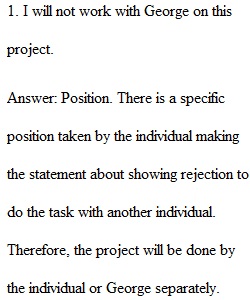


Q 5.1 Exercise: Labelling Label each statement as a position, interest, BATNA or some combination thereof. (5 each) 1. I will not work with George on this project. 2. I want to be sure the project gets done right and on time. 3. I won’t take less than a full refund. 4. Your employee was rude to me. I have been a customer for years and I deserve better treatment than this! 5. The union will not accept less and a $2.00 pay raise and 2 additional vacation days for our employees. 5.2 Exercise: Creating "I" Statements For each statement, change the ‘you-statement’ to an “I-statement”. Change the framing from past-focused, destructive language to forward-focused language with a neutral or positive focus. 5 each Example: “You need to do your share of the work on this project. No more shirking!” New framing: “I am worried this project won’t get completed on time. How can we fairly share the workload to ensure I goes well?” 1. “You are always late to staff meetings and it is disruptive to the rest of the team”. 2. “You are not a team player. You make decisions without consulting the rest of us or thinking about how we will be affected”. 3. “Your reports were late the last three months in a row. The rest of us can’t meet our deadlines if you don’t meet yours.” 4. “You people from sales really don’t understand what we do here in production”. 5.3 Exercise: Reframing These comments were heard at a public meeting in regards to a zoning issue that would allow a ‘big-box’ store to locate near Main Street of a small town. Imagine you are the public employee tasked with recording public comment and then setting the agenda for discussions between city officials and concerned citizens. Reframe positions as interests. Reframe destructive, past-focused comments into constructive, forward-focused comments. 5 each Example: “I don’t want this town turning into a generic-looking suburb with no character and only poorly paid jobs!”. Reframe for the agenda: “If I understand correctly, you are concerned about maintaining the town’s current character and ensuring the economic viability of its residents?” 1. I don’t want huge trucks on our small roads, endangering our children! 2. If it does get built, this store should not be open 24 hours a day---I live next door and do not want to hear trucks coming and going at all hours and forklifts beeping at 2:00am. 3. I think the store should be allowed to open. Government should not interfere with free enterprise. 5.4 Exercise: Limits of Mediation Watch this simulated mediation then answer the questions below: 1. Is this a good problem for a mediation? Why or Why not? (1/2 page max, 15 pt) 2. What other techniques besides mediation might you use for this? Name two and explain how they could have helped? (1 page max, 15 pt) Objective: 5g 5.5 Exercise: Mediators' Role Watch the following clip from "The Wedding Crashers" and answer the questions below. While you watch it, think about how they are doing their job as mediators. (warning some adult language and content bhut you face that in real life mediation) 1. Think about what Mayer says mediators do in Chapter 10. What techniques are used here to get the parties to reach an agreement (see pages 288-297 especially)? (15 points, 1 page max) 2. What, based on Mayer, would you do differently? That is, what might you try more and/or less of? Give an example of what you might say and technique you might use over the argument about frequent flyer miles (15 points, 1 page max) Objectives: 5e, 5d, 4c, 5i
View Related Questions